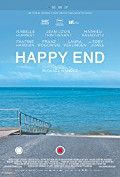
Directed by
Michael Haneke
117 minutes
Rated MA
Reviewed by
Bernard Hemingway

Happy End
Synopsis: The Laurents, a well-to-do upper bourgeois Calais family, weathers a number of crises.
Writer-director Michael Haneke made his reputation with a run of cooly intellectual films in the 1990s and early 2000s before giving us the uncharacteristically empathetic drama, Amour in 2012. Although Haneke in various ways once again challenges our conventional expectations, his follow-up is very much in the same heartfelt spirit as that earlier film. Indeed he makes an explicit connection to it in the closely-related character of Georges, the Laurent family’s octogenarian patriarch who is played by Jean-Louis Trintignant, the husband in Amour (his wife there, Emmanuelle Riva has since died) with Isabelle Huppert once again as his daughter.
This time the canvas is broader in a film that although it takes some time to warm to and at times needlessly throws us off course is an absorbing portrait of a family for which the term “dysfunctional” barely begins to account.
Huppert plays Anne, the effective head of the Laurent family and its large scale construction business. The firm is under investigation after a site accident in which a worker died. At home her father (Trintignant), who is suffering from early stage dementia, is tired of living and trying to end his days. But that’s not all! Anne’s married brother Thomas (Matthieu Kassovitz) whose second wife, Anais (Laura Verlinden) has recently had a baby is having an affair; Thomas’s first wife has OD’d and his troubled 13 year old daughter from that marriage, Eve (Fantine Harduin), has come to live with them. Finally, Anne’s adult son, Pierre (Franz Rogowski), who is managing the business, is rebelling against his privileged life.
It would take a brave man or woman to tackle such a farrago of tribulation but Haneke does so brilliantly by making us work to put the pieces together rather than the Hollywood approach of spelling out their connections. Thus in the film’s opening sequence in which via a Smartphone we voyeuristically watch a woman performing her night-time toilette we have no idea who she is or who (other than ourselves) is watching her. Similarly, later we see a sequence of lovers’ erotic texts being exchanged via a lap-top but don’t know between whom until a good way into the film. Haneke perhaps takes things too far in this respect with a couple of sequences which seem to have nothing to do with the narrative (one turns out to be a Youtube clip being watched by Eve, the other involving a bizarre break-dance performance I’m not sure) but the overall effect is to keep us engaged with a film whose core idea is very familiar
The performances too help. Huppert and Trintignant stand-out amongst a flawless cast with Fantine Harduin doing a remarkable job in such illustrious company. I can’t say however that there was any need that I could see for the Toby Jones character, Anne's unlikely paramour. And going into it I had the impression that it had to do with the refugee crisis in France but this material is largely kept in the background.
Happy End is not a film that gives up its rewards easily but if you’re prepared to put in the effort you shouldn’t come away disappointed.

Want more about this film?


Want something different?




